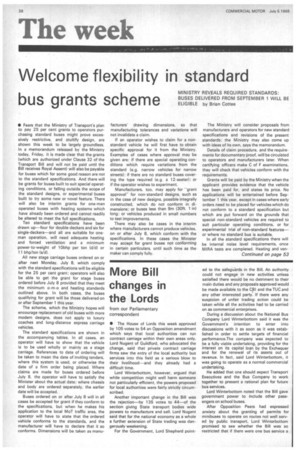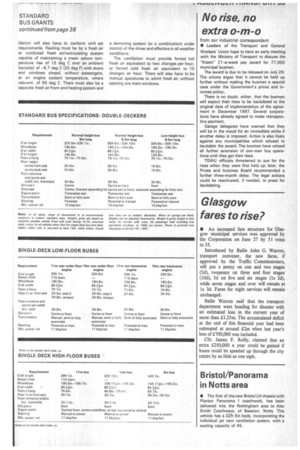Welcome flexibility in standard bus grants scheme
Page 40

Page 55

If you've noticed an error in this article please click here to report it so we can fix it.
• Fears that the Ministry of Transport's plan to pay 25 per cent grants to operators purchasing standard buses might prove excessively restrictive, and stultify design, are shown this week to be largely groundless. In a memorandum released by the Ministry today, Friday, it is made clear that the grants (which are authorized under Clause 32 of the Transport Bill and will not be paid until the Bill receives Royal Assent) will also be payable for buses which for some good reason are not to the standard specifications. And there will be grants for buses built to suit special operating conditions, or falling outside the scope of the standard designs, or experimental buses built to try some new or novel feature. There will also be interim grants for one-man operated buses with heating systems which have already been ordered and cannot readily be altered to meet the full specifications.
Ten standard specifications have been drawn up—four for double-deckers and six for single-deckers—and all are suitable for oneman operation, will need adequate heating and forced ventilation and a minimum .power-to-weight of 10bhp per ton (did) or 11 bhp/ton (s/d).
All new stage carriage buses ordered on or after next Monday. July 8, which comply with the standard specifications will be eligible for the 25 per cent grant; operators will also be able to get the grant for stage buses ordered before July 8 provided that they meet the minimum o-m-o and heating standards outlined above. In both cases, the buses qualifying for grant will be those delivered on or after September 1 this year.
The scheme, which the Ministry hopes will encourage replacement of old buses with more modern designs, does not apply to luxury coaches and long-distance express carriage vehicles.
The standard specifications are shown in the accompanying tables. In all cases, an operator will have to show that the vehicle is to be used wholly or mainly as a stage carriage. References to date of ordering will be taken to mean the date of inviting tenders, where this system is used, or otherwise the date of a firm order being placed. Where claims are made for buses ordered before July 8, the operator will have to satisfy the Minister about the actual date: where chassis and body are ordered separately, the earlier date will be accepted.
Buses ordered on or after July 8 will in all cases be accepted for grant if they conform to the specifications, but when he makes his application to the local MoT traffic area, the operator will have to state that the ordered vehicle conforms to the standards, and the manufacturer will have to declare that it so conforms. Dimensions will be taken as menu
facturers' drawing dimensions, so that manufacturing tolerances and variations will not invalidate a claim.
If an operator wishes to claim for a nonstandard vehicle he will first have to obtain specific approval for it from the Ministry. Examples of cases where approval may be given are: if there are special operating conditions which require variations from the standard (e.g. narrow vehicles for narrow streets): if there are no standard buses covering the type required (e.g. a 12-seater): or if the operator wishes to experiment.
Manufacturers, too, may apply for -grant approval" for non-standard designs, such as in the case of new designs, possible integrally constructed, which do not conform in dimensions; or buses less than 9m (30ft. 1 in) long; or vehicles produced in small numbers to test improvements.
There may also be cases in the interim where manufacturers cannot produce vehicles, on or after July 8, which conform with the specifications. in these cases the Minister may accept for grant buses not conforming in certain particulars, until such time as the maker can comply fully. The Ministry will consider proposals from manufacturers and operators for new standard specifications and revisions of the present standards; the Ministry may also come up with ideas of its own, says the memorandum.
Details of claim procedure, and the requirements for documentary proof, will be circulated to operators and manufacturers later. When certifying officers make C of F examinations, they will check that vehicles conform with the requirements.
Grants will be paid by the Ministry when the applicant provides evidence that the vehicle has been paid for, and states its price. No applications will be entertained before September 1 this year, except in cases where early orders need to be placed for vehicles which do not conform to a standard specification but which are put forward on the grounds that special non-standard vehicles are required to suit particular operating conditions, or for experimental trial of non-standard features— or where no standard bus is suitable.
In all the standard specifications there will be internal noise level requirements, once MIRA tests are completed. Heating and ven
tilation will also have to conform with set requirements. Heating must be by a fresh air or combined fresh air/recirculating system capable of maintaining a mean saloon temperature rise of 15 deg C over an ambient (outside) of -6.7 deg C (20 deg F) with doors and windows closed, without passengers, at an engine coolant temperature, where relevant, of 65 deg C. There must also be a separate fresh air front-end heating system and
a demisting system (or a combination) under control of the driver and effective in all weather conditions.
The ventilation must provide forced hot fresh air equivalent to two changes per hour, or forced cold fresh air equivalent to 10 changes an hour. There will also have to be manual aperatures to admit fresh air, without opening any main windows.
























































































































































